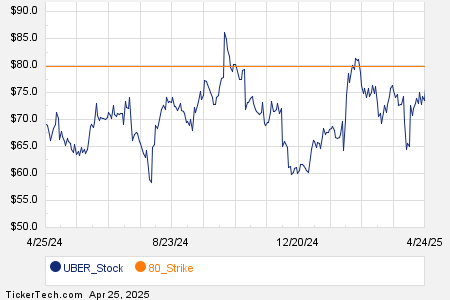February typically conjures up images of Valentine’s Day and romance, but in the realm of stocks, some familiar names are sparking skepticism in the market. Investors who refuse to part ways with F-rated stocks in their portfolio are courting heartbreak.
The market has kicked off the year on a high note, with the Dow Jones Industrial Average gaining 2%, the S&P 500 index seeing nearly a 5% increase, and the Nasdaq composite surging up by 5.6%. As such, there’s a slew of appealing names out there and significant optimism that the market is positioned for a robust 2024.
One effective tool in my arsenal to sift through stocks is the Portfolio Grader, which helps me identify A-rated stocks to buy and F-rated stocks to sell.
The Portfolio Grader harnesses various metrics to evaluate stocks, including analyst sentiment, momentum, growth, earnings performance, and several other factors. Each stock receives a letter grade, making it a breeze to pinpoint the F-rated names.
While it’s only the first quarter of the year and there’s still ample time for a turnaround, I see no reason for investors to remain in the red by holding onto F-rated stocks rather than cutting their losses. Here are seven names you ought to toss out of your portfolio come February.
Lucid Group (LCID): Straying From Its Highs

Source: ggTravelDiary / Shutterstock.com
Lucid Group (NASDAQ:LCID) is a California-based automaker established in 2007, with an assembly plant in Arizona, striving to establish itself in the booming electric vehicle space.
The stock has exhibited some signs of life this year, with a 14% rise in the last month. Nonetheless, Lucid still remains distant from its 2021 peak when it reached over $55 per share.
However, the company’s trajectory is less than encouraging. Vehicle deliveries in the fourth quarter plummeted by 10% to 1,734, while production dropped by 32%, resulting in 2,391 vehicles built. In the third quarter, revenue took a dip from $195.4 million to $137.8 million, and losses ballooned from $530.1 million to $630.8 million in Q3 2023.
With a plethora of downsides including weak demand, mounting losses, and shareholder dilution, Lucid truly struggles to appeal to investors. It’s no surprise that it earns an “F” rating in the Portfolio Grader.
Fisker (FSR): Gearing for a Bumpy Ride

Source: Eric Broder Van Dyke / Shutterstock.com
Fisker (NYSE:FSR) is yet another automaker that lands on the list of F-rated stocks to steer clear of. A few years back, there was a surge of optimism that multiple electric vehicle companies would rise up to challenge Elon Musk’s dominion. However, that hope doesn’t seem to translate to reality, especially not for Fisker.
Fisker is now taking several measures to offset its looming debt woes. The company is embarking on a cross-country tour to drum up interest, and there are indications that a shift in its business strategy is in the cards.
Presently, investors had expected Fisker to focus on scaling up its business instead of retracing its steps. In 2023, Fisker churned out a mere 10,142 vehicles, with deliveries commencing in June. The company reported $71.8 million in revenue in the third quarter, but racked up nearly $100 million in overall losses.
With FSR stock plunging by a staggering 88% over the past year and trading at less than $1 per share, it’s beckoning for an “F” grade in the Portfolio Grader.
Mullen Automotive (MULN): On a Rocky Road

Source: rafapress / Shutterstock.com
Mullen Automotive (NASDAQ:MULN) rounds up the trio of EV stocks in dire straits on this list, and this one might be the worst off. Despite the stock price appearing more favorable compared to others in the list, hovering just above $7, it’s simply a result of financial gymnastics.
Mullen carried out three reverse stock splits in 2023 in a bid to maintain Nasdaq compliance and stay above $1 per share. It underwent a 1-for-25 split in May, a 1-for-9 split in August, and then a 1-for-100 split in December.
While it seems like Mullen is poised for a comeba
The Rollercoaster of Stock Performance: Pfizer, Mullen and More
Amidst the ever-changing landscape of the stock market, the past year has been a tumultuous ride for companies across various sectors. As businesses grapple with the challenges brought about by the global pandemic, the ebb and flow of stock performance has been a critical area of focus for investors. Let’s take a closer look at the recent ups and downs of some prominent companies in the market.
Pfizer (PFE): A Case of Stalled Momentum

Source: photobyphm / Shutterstock.com
While Pfizer (NYSE:PFE) garnered widespread applause for its rapid development of a Covid-19 vaccine, its recent trajectory paints a contrasting picture. The company’s fourth-quarter earnings of $14.2 billion marked a significant decline of 41% from the previous year. With income plummeting to $593 million and 10 cents per share from $6.5 billion and $1.14 per share year-on-year, the market sentiment has soured.
The Portfolio Grader echoes this sentiment by assigning an “F” rating to PFE stock, emphasizing the prevailing challenges faced by Pfizer as it navigates through these turbulent times. It Despite some stellar accomplishments in the recent past, the current landscape appears to be a stark deviation from the past, leading to a dampened outlook for Pfizer.
Medical Properties Trust (MPW): Weathering Unforeseen Turbulence

Source: venusvi / Shutterstock.com
Medical Properties Trust (NYSE:MPW) finds itself in the thick of unforeseen challenges despite its astute investment strategies. The company, which specializes in healthcare facilities with triple net leases, faced a setback of $50 million as Steward Health Care System defaulted on their rent payments, sending ripples through the company’s financial health.
While the market had anticipated a more insulated position for Medical Properties Trust, the recent downturn in revenue from $352 million to $306 million, as well as a staggering 70% drop in MPW stock over the last year, point to an unsettling narrative. The Portfolio Grader’s “F” rating underscores the uphill battle that lies ahead for the company as it grapples with these unexpected turns of events.
ChargePoint Holdings (CHPT): Navigating a Bumpy Terrain

Source: YuniqueB / Shutterstock.com
ChargePoint Holdings (NYSE:CHPT) stands at a crossroads as it grapples with the complex landscape of electric vehicle infrastructure amidst a turbulent market. Despite significant investments by the U.S. government aimed at bolstering the number of charging stations, ChargePoint’s financial health faces a precarious situation, marked by a staggering $158.2 million loss in its third quarter of fiscal 2024.
The company’s decision to downsize its workforce by 12% and its shrinking stock value—plummeting to an 80% decline this year—reflect the intricate challenges it grapples with. The Portfolio Grader’s “F” rating further compounds the company’s struggles, posing critical questions about its ability to navigate the unrelenting headwinds ahead.
Chewy (CHWY): A Glimmer of Hope Amidst Market Turmoil
Chewy (NYSE:CHWY) presents a refreshing counterpoint amidst the grim landscape of recent stock performances. The company’s resilience in the face of market volatilities and an uncertain economic climate has garnered attention, offering a glimmer of hope for investors. Charger’s ability defied the odds, reinforcing investor’s confidence in the company’s long-term sustainability.
Despite the prevailing headwinds, Chewy’s steadfastness and unwavering resolve serve as a beacon of optimism in an otherwise tumultuous market. In the midst of uncertainty, Chewy’s performance offers a testament to the strength and solidity that lies at the core of the company’s operational strategies. Indeed, in this ever-changing financial climate, Chewy emerges as a resolute figure amidst the flux and unpredictability that defines the current market narrative.
The Chewy Conundrum: Dealing with Tough Comparisons Amidst Economic Shifts

Source: rafapress / Shutterstock.com
Changed Pet Parenting Landscape
Chewy (NYSE:CHWY) finds itself in a tough spot as it contends with the changing dynamics of pet ownership. The onset of the pandemic marked a substantial surge in pet adoption, attributed partly to the increase in disposable income and leisure time resulting from government stimulus checks and stay-at-home measures. However, with the office grind resuming, inflation taking a toll on household incomes, and escalating debt burdens, the pet care landscape has encountered a paradigm shift.
Financial Performance
The third-quarter results exhibit a modest increase in revenue, climbing to $2.7 billion from the previous year’s $2.5 billion. Nevertheless, Chewy reported a significant net loss of $35.8 million, diverging sharply from the $2.3 million gain recorded a year ago. This unsettling performance is further reflected in CHWY’s stock, which has plummeted by 67% over the past year, culminating in an “F” rating in the Portfolio Grader.
On the date of publication, neither Louis Navellier nor the InvestorPlace Research Staff member primarily responsible for this article held (either directly or indirectly) any positions in the securities mentioned in this article.


